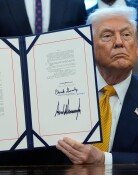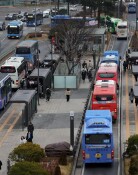The Face of the Kuwaiti Landscape
The Face of the Kuwaiti Landscape
Posted March. 13, 2003 22:23,
In Kuwait, the main staging base of US forces in the Gulf, tension and calm, opportunity and danger, flit back and forth on a daily basis among Kuwaitis. This duality pulls to each side of the spectrum in that Kuwait wants to keep its independence as a small country of 2,110,000 people in an area the size of Gyongsangbuk-do.
Kuwait means `small fort` in Arabic. The name originated from the fact that the Portuguese built a fort here in the early 16th century. In her short history of 300 years, Kuwait has been invaded by Osman Turks, Saudi Arabia, Iraq, and Iran, but has survived by functioning as a strategic point for UK and US interests in the Gulf. The whole country relies heavily on its vast natural resources of `black gold,` or oil.
On March 13, the capital of Kuwait, in which most of the population lives, was calm. Despite of the fear of bio-chemical attack, the only ones carrying gas masks were US soldiers and a few western reporters. However, as soon as we left the city using the number 80 road to the border, a parade of US Army trucks and armored vehicles appeared. They arrived at the Port of Shuaiba to head to the front line. Reinforcement of US forces continued in a constant stream. In the opposite direction, armored vehicles of the British Army passed by.
It is only some 100 km from Kuwait to the targeting area at the border, Al Abdali. Both sides of the road are all sand. A banner saying, `God Bless US troops` hangs over a road sign.
Tension hangs everywhere as the invasion looms. Check-points have begun to be setup and the Kuwaiti Army thoroughly searches and questions any reporter getting too close to the border. We passed the check-point where the rangefinder of the car indicated 57km, but we had to turn the car around at the 83km point because we did not have `passes.` A guard apologized about the roadblock and said repeatedly in poor English, “Saddam Hussein is over.”
There still were deep scars from the invasion of Kuwait by Iraq in 1990. Female college students we met at the University of Kuwait, Isha (18) and Dillal (18) said, “Hussein is responsible for this war,” and “we would like to live in a world where there is no Hussein.” In Kuwait, a 32-year-old female Asra, who was killed in the resistance movement during the Iraqi occupation, and former US President George Bush, who retook Kuwait, are adored as heroes.
However, they also worry about retaliation on the part of Iraq. The Vice President and Defense Minister Al Muvarak Hamad carefully said, “Kuwait is not participating in the war. We are just lending them bases according to the Mutual Defense Support Agreement concluded in 1992 with the US.”
Although there was a report that few Kuwaiti people can escape the possibility of war, Isha said, “My relatives are coming back to show their patriotism…since we have lived with the threat of war, we do not particularly feel any fear.” Around 800,000 Kuwaiti people, less than half the total population, enjoy prosperity with several maids and chauffeurs for every household. In the college parking lot, Mercedes E280, E240, and E230 series are lined up as if it were a Mercedes show room. Dillal left in a chauffeur-driven E280 after the interview.
A Sri Lankan, who was working in Kuwait smiled mockingly and said, “Far from the patriotism, many Kuwaiti people pass through the airport and only foreigners, who came to work here for food, from Egypt, Bangladeshi, India, and Philippines will defend Kuwait.”
Eun-Taek Hong euntack@donga.com







